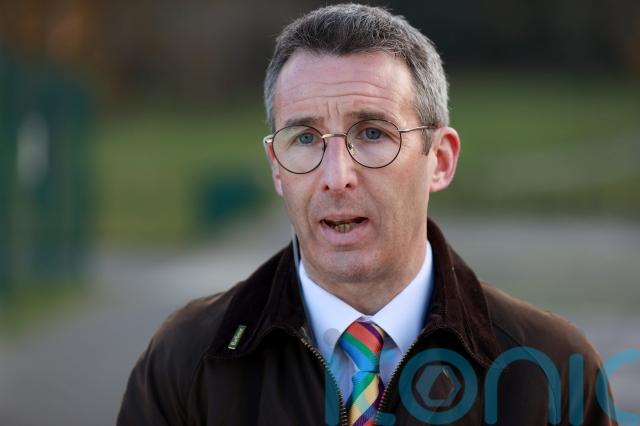
Northern Ireland’s first draft Climate Action Plan sets a target that 80% of the region’s electricity should come from renewable sources by 2030.
The roadmap also proposes reducing the amount of waste that goes to landfill to 10% by 2035 and planting 9,000 hectares of new woodland by the end of the decade.
Launching a 16-week consultation on the plan, Environment Minister Andrew Muir described it as a “milestone moment”.
The action plan is a legal requirement of the Climate Change Act that was passed by the Northern Ireland Assembly in 2022.
It sets out the proposed path that Northern Ireland will take to reduce greenhouse gas emissions to net zero by 2050 as well as achieving a carbon budget target of a 33% average annual reduction in emissions between 2023 and 2027.

Mr Muir said: “I am fully committed to delivering Northern Ireland’s first Climate Action Plan – one that is grounded in robust science and evidence, shaped by stakeholder voices, necessarily ambitious and aligned with our pledge to a just transition.
“This isn’t just a plan, it’s a roadmap towards a more sustainable future.
“The publication of the draft Climate Action Plan is a milestone moment that will inform how we reduce our emissions, grow our green economy, protect our environment and improve our health and wellbeing.”
The minister said the collapse of the powersharing Executive in 2022 meant that some pace on creating the plan had been lost, adding “we can ill afford to delay or defer action”.
During the 16-week consultation period, a series of consultation events, including sector-specific sessions, will be held across Northern Ireland.
The plan sets out a number of policies and proposals to reduce emissions, affecting several Stormont departments.
These include the proposals to increase the proportion of electricity produced from renewable sources with an 80% target by 2030.
The plan also sets a policy direction of switching vehicle fuels to low-emission alternatives, improving energy efficiency in residential buildings, including through better insulation and reducing energy consumption in the government estate.
It targets an increase in household recycling, increasing municipal waste recycling to 65% and reducing waste to landfill to 10% by 2035.
The plan includes a policy of reducing nitrogen fertiliser use in agriculture, creating 9,000 hectares of new woodland by 2030 and restoring 10,000 hectares of peatland by 2027.
Mr Muir said: “We have seen the damaging and costly impacts of climate change around the world and closer to home from flash flooding, wildfires and more frequent and severe storms.
“No section of society is immune.
“It is essential we take action and I would encourage everyone to take part in this 16-week consultation.”
Met Office chief scientist, Professor Stephen Belcher, said: “We can see our climate is rapidly changing in our observations.
“We have a responsibility to future generations to reduce emissions of greenhouse gases to net zero to stabilise the climate.
“And we also have a responsibility to citizens now and to future generations to accelerate our efforts to adapt to the extreme weather events we are seeing now in our changing climate.
“Action plans such as this are a vital step in this journey and the consultation on this plan is a valuable opportunity for the public to engage with this process.”
Subscribe or register today to discover more from DonegalLive.ie
Buy the e-paper of the Donegal Democrat, Donegal People's Press, Donegal Post and Inish Times here for instant access to Donegal's premier news titles.
Keep up with the latest news from Donegal with our daily newsletter featuring the most important stories of the day delivered to your inbox every evening at 5pm.